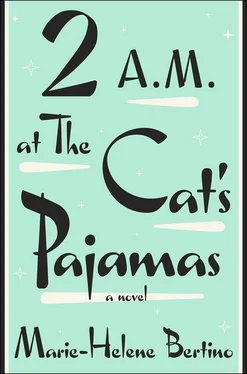The Rottweiler ignores its name, which is, improbably, Grace. The blond owner cannot get Grace to let go, and Ted cannot wrench Malcolm out of her jaws. Suddenly Grace pauses. Her owner and Ted pause, too. Malcolm, petrified, searches for Ted. Who is this, why is this happening to me?
“Someone,” Ted chokes, “help.”
A police officer arrives. He takes one tentative step toward the two-dog tableau, then another, crooning promises and compliments. His hand is poised on his holster. To his aggravation, the crowd begins to make suggestions.
“You can’t pull a dog from a dog,” someone says.
“Don’t you think I know that?” the officer says.
Grace the Rottweiler’s eyes flick from her owner to the officer. She raises Malcolm to the uppermost point of her flinging trajectory, then pauses again, as if to test her control over the scene.
“Drop it, Grace?” her owner says.
Malcolm yowls. Scared by the sound, Grace begins thrashing again. Her teeth gnash through Malcolm’s sweater. Her muzzle darkens with blood. The officer raises his gun and fires once into the sky. Grace, startled, releases her hold on Malcolm, who falls to the sidewalk. The officer scoops up the pit bull and Grace is immediately captured by her owner.
A woman arrives with salves and bandages that she applies to Malcolm on the sidewalk. She is a vet or a bandage supplier, Ted fades in and out of understanding, she had been walking by …
“His name is Malcolm.” Ted holds the bridge of his nose as tears course down his cheeks.
The woman places Malcolm into his arms. “He’s scared, but he’s fine.”
Malcolm, from the sea of cotton bandages, looks at him with a mixture of fear and (it cannot be) adoration.
Cradling the dog to his chest, Ted walks home. He spends the day with Malcolm on his lap, reading aloud to him, changing his dressings, encouraging him to eat. When it is time for his shift he brings Malcolm to the store and arranges his bed behind the counter. He cooks a batch of his famous meatballs. The store fills with their sweet, earthy smell. It is midnight when his cell phone vibrates in the pocket of his jeans. Delilah. He wants to tell her that he has experienced a universal near miss. He wants her to say Malcolm will be recovered in no time.
Instead, Delilah goes first. “Do you want to tell me how you were on South Street today talking to some dumb bitch when you were supposed to be working? She saw you. Gina saw you on South Street.”
“Gina?” Ted says.
“I am coming there after my shift and you’d better be ready to explain how when you were at work you were also in Center City talking to some dumb bitch.”
Ted hangs up the phone. A couple enters the store and surveys the produce. He checks on Malcolm, who has been asleep for the past hour, head nestled between his marshmallow paws.
When Delilah arrives, Ted will tell her that they will never again be naked and clasped at the middle, thrusting toward her signed poster of Shane Victorino. He will never again have to use her cheap, cotton candy soap. He will never again have to deal with her accent: the tinned a’ s, the sour o’ s, the spine-splitting sound of l’ s pronounced as w’ s. Gina sawl you on South Street.
This decision fills Ted Stempel with a happy, reasonable light.
When the couple reaches the counter, he responds to the woman’s smile with an even bigger one.
“How are we tonight?” He rings the man up for his pears.
“Look at that adorable dog.” The woman cranes her neck over the counter. “What’s his name?”
“Malcolm,” says Ted.
“If I had a dog that cute, I’d take him to work with me, too,” the woman says.
“He’s got bandages on,” says the man. “Is he okay?”
Ted swells with pride. “He’s a champion. On second thought.” He voids the transaction. “The pears are free.”
“Really?” the man says.
“Free pear night,” Ted says. “Everyone gets free pears.” He hands the money back to the man.
“How nice of you,” the woman says. Then, to Malcolm, “See you later, alligator.”
Ted replies for him. “After a while, crocodile.”
“Is there anything as satisfying as a pear?” Ben says, when they are back on the street.
“Yes,” Sarina says, “but you can’t eat it and walk.”
Ben’s eyebrows ascend. He always forgets that she is funny. That underneath her traditional exterior is the girl who wore only black in high school. “Pardon me, Miss Greene?”
Sarina’s cheeks turn the color of ham.
They walk and eat their pears. Night allows the objects of Christian Street to hide except for where the streetlights call them out. There you are, newspaper stand. Hello . A discarded umbrella: Hello . A hydrant. A chained bike. Sarina and Ben walk in and out of these salutations. A sign on a fence promises a community garden, after several false starts, is coming. Featuring basil and daffodils. For real this time.
Madeleine waits until Miss Greene and Ben are a block away before emerging from behind a truck. She hears her teacher’s laughter unfurl like a scarf. Outside the store, produce shines. Madeleine feels around her pockets for change. Nothing. Her stomach protests. She could steal an apple. There are hundreds. She will be fast, dangerous!
Madeleine checks inside the shop, then sleeves a Rome Beauty.
“What have you got there, little girl?” a voice behind her says. It is the store’s clerk. “I have had it today,” he says. “With the drama.”
Madeleine shakes the apple out of her sleeve. “I shouldn’t have taken it.”
The clerk returns it to its stack. “It’s stealing.”
“I know,” she says. “I’m sorry. I haven’t eaten since breakfast.”
“You look familiar.” He narrows his eyes. “Who are you?”
“Madeleine Altimari.”
“Come in here.” He disappears into the store. Madeleine considers escape, but she has attended too many years of Catholic school to run. She follows him. The store is unswept. Bruised canisters of tomatoes. Deflated bags of rice. Madeleine expects to see a cockroach scurry up the walls.
Behind the counter, the clerk loads a hoagie roll with meatballs. A dog at his feet whirrs at the smell. “Not for you,” the clerk says. A television hanging in the corner is tuned to a news report about a famous actress. “Do you think it will help the city’s tourism to have famous people visit?” a reporter asks some yackamo in Fox Chase.
“I don’t have a crystal ball.” The yackamo shrugs.
Madeleine shrugs.
The clerk is satisfied with the heft and bulk of the sandwich. “You want cheese? We’ve got American and Swiss.”
“Any Locatelli?” she says.
“That’s for pasta.”
Madeleine’s voice is sad. “The saltiness brings out the flavor of the meat.”
“You’ll have to eat this one without it.” He wraps the sandwich in aluminum foil and holds it out to her. “Take it,” he says. He readjusts his tack when she balks. “I knew your mother.”
Madeleine knows she should not take food from strangers, but also that the city is a network of her mother’s promises. Hunger punches her stomach. She unwraps half of the sandwich and takes a large bite she can barely control. Her eyes move from the man to the door.
“Got somewhere to go?” he says. The phone behind the counter rings. He answers it.
Madeleine’s mouth is full. “Thank you.” Clutching the sandwich, she runs out of the store.
“Hey!” he calls.
On South Street, clusters of people smoke on the sidewalk. In a church that’s not Saint Anthony’s, a bell chimes. Madeleine catches up to Miss Greene and Ben and follows a gasp behind.
Читать дальше












